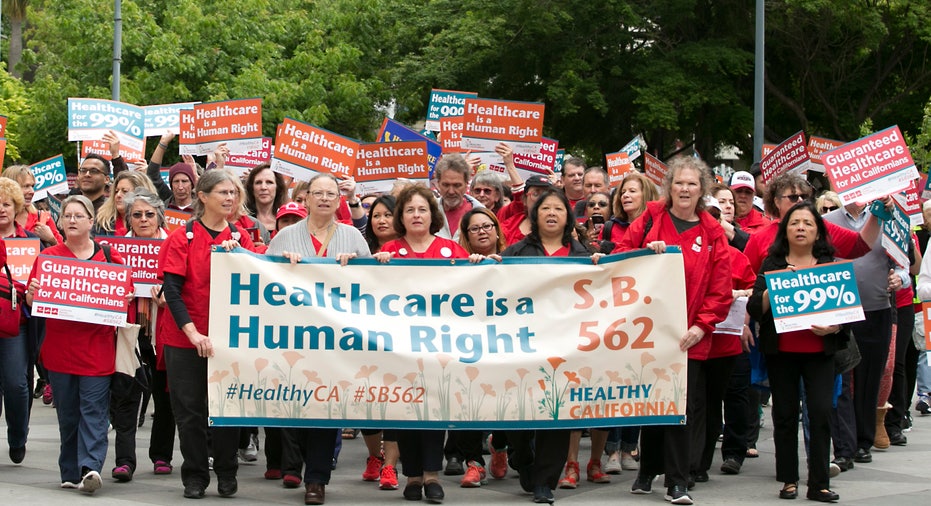Plan to give health care to every Californian moves forward

SACRAMENTO, Calif. – California lawmakers pushed forward Wednesday with a proposal that would substantially remake the health care system of the nation's most populous state by replacing insurance companies with government-funded health care for everyone.
The idea known as single-payer health care has long been popular on the left and is getting a new look in California as President Donald Trump looks to replace former President Barack Obama's health care law.
The proposal, promoted by the state's powerful nursing union and two Democratic senators, is a longshot. But supporters hope the time is right to persuade lawmakers in California, where Democrats like to push the boundaries of liberal public policy and are eager to stand up to the Republican president.
"It is time to say once and for all that health care is a right, not a privilege for those who can afford it," said Democratic Sen. Ricardo Lara of Bell Gardens, who wrote the bill along with Democratic Sen. Toni Atkins of San Diego.
Hundreds of nurses clad in red rallied in support of the measure and marched to the state Capitol in Sacramento, packing the hallways before a Senate Health Committee hearing. They were joined by Democratic activists and supporters of Vermont Sen. Bernie Sanders, who advocated single-payer health care in his unsuccessful presidential campaign and has introduced federal legislation.
Democrats on the panel voted to advance the measure.
The measure would guarantee health coverage with no out-of-pocket costs for all California residents, including people living in the country illegally.
Private insurers would be barred from covering the same services, essentially eliminating them from the marketplace. Instead, a new state agency would set prices and contract with health care providers such as doctors and hospitals and pay the bills for everyone.
However, an essential question is unanswered: Where will the money come from? California health care expenditures last year totaled more than $367 billion, according to the Center for Health Policy Research at University of California, Los Angeles.
The measure envisions using all public money spent on health care — from Medicare, Medicaid, federal public health funds and "Obamacare" subsidies. But it also would require significant tax increases on businesses, residents or both to replace billions of dollars in health care spending by employers and individuals while generating enough money to cover people who are currently uninsured.
The California Nurses Association commissioned a study of the costs and potential funding methods that will be ready before the measure goes before the next committee later this year, spokesman Chuck Idelson said.
Employers, business groups and health plans have mobilized in opposition, warning that the measure would require massive tax increases and force patients into lengthy waits to see a doctor.
They say the state should stay focused on implementing Obama's health care law, which is credited with significantly reducing the ranks of California's uninsured.
"California can't afford a single-payer health care system," said Charles Bacchi, president and CEO of the California Association of Health Plans. "It's going to reduce the quality of care. We think it will restrict access to care, and it will be incredibly disruptive to all the Californians who currently get health care coverage through their employer."
The idea faces significant hurdles.
The bill, SB562, would affect everyone — not just the roughly 8 percent of Californians without insurance — including people on Medicare and private, employer-sponsored insurance, plans that are generally well-liked.
Two-thirds of the Assembly and Senate also must approve the tax increases required to fund it.
And even if it were to clear the Legislature and be signed by Democratic Gov. Jerry Brown, it would need cooperation from Trump's administration to waive rules about federal Medicare and Medicaid dollars.
The idea to increase the government's role in health care comes as Trump and congressional Republicans look to reduce it. The conservative House Freedom Caucus on Wednesday announced its support for a newly revised GOP health care bill, a month after its opposition forced Republican leaders to pull the legislation.
California lawmakers have considered single-payer health care several times before. The Legislature approved a single-payer bill in 2007 but it was vetoed by then-Gov. Arnold Schwarzenegger.
More recently, Vermont abandoned an attempt to create a single-payer system when cost estimates came in high. Colorado voters last year rejected a ballot measure that would have created the system.
"By having everything in one pool, you're going to decrease administrative costs, and you're also going to get away from a system where so many different players in the system are there only because of greed, because they want to make money off of people's health care needs," said Thorild Urdal, a nurse in Oakland who is originally from Norway, which has government-funded health care.



















